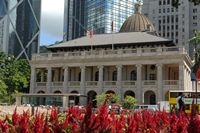 |
| No.6 June, 2010 |
|
| |
|
| |
Hong Kong adopts historic democratic reform package |
|
| |
|
|
| |
 The Special Administrative Region’s law-making body, the Legislative Council (LegCo) at its sitting on June 25 has approved the 2012 constitutional reform package with a three-quarters majority that is going to pave the way for Hong Kong’s democratic development, bringing the city closer than ever to universal suffrage. The Special Administrative Region’s law-making body, the Legislative Council (LegCo) at its sitting on June 25 has approved the 2012 constitutional reform package with a three-quarters majority that is going to pave the way for Hong Kong’s democratic development, bringing the city closer than ever to universal suffrage.
It is the first time since the 1997 Handover that LegCo has used procedures laid out in the city’s mini-constitution – the Basic Law – to amend the selection process for the Chief Executive and the make-up of the legislature. |
|
| |
|
|
| |
Chief Executive Donald Tsang told reporters that he would give consent to the five-step amendment process as soon as it was finalised. The decision will then be formally reported to the National People's Congress Standing Committee in Beijing.
Before the LegCo summer recess, its Constitutional Affairs Panel will be consulted on details for the two elections in 2012. Legislative proposals on the election methods and the abolition of the District Council appointment system will be submitted to LegCo when it resumes in autumn.
Mr Tsang said the reforms were a milestone in the city's democratic development, improving the city's electoral system and paving the way for the community to pursue detailed arrangements for universal suffrage according to the established timetable.
He said passage of the reforms had been a valuable experience for the Government, political parties and the community in its implementation of the Basic Law, adding the process fostered trust, communication and tolerance at all levels of the community.
"What we see today is not a victory of any individual or any one party," Mr Tsang said.
"It is a triumph of reason for the entire Hong Kong community.
"But all this would not have been possible without the dedication and hard work of many men and women.
"They work in various political parties, in the Government, in the office representing the Central Government in Hong Kong, and in the central authorities. They share the same objective of promoting democratic development in Hong Kong."
Mr Tsang said history would positively record the actions of those who had contributed to the process.
"Reformers often have to face opposition and attacks, and others have to preserve the common benefits of the community with courage, humility and patriotic passion. Many have to make difficult adjustments for the common good," he said.
Mr Tsang said it was unrealistic to expect political reform to be painless in a pluralistic society like Hong Kong.
"I hope from now on, divisions, attacks and hatred will become bygones. Let us put behind us what is past and focus on the tasks ahead," he said.
"After all, we all call Hong Kong home. We all cherish democracy. There is no reason why we cannot close ranks for our common goal of full democracy in Hong Kong.
"The vote today is both an end and a beginning. Hong Kong will no longer be the same. More and more people will join us on this journey to democracy and to the promised land of universal suffrage. With growing strength and confidence, we will overcome each and every challenge coming our way."
|
|
| |
|
|
|
| |
 |
|
|
| |
|
|
|
| |
|
|
|
|
 |

